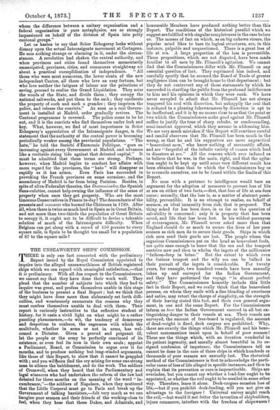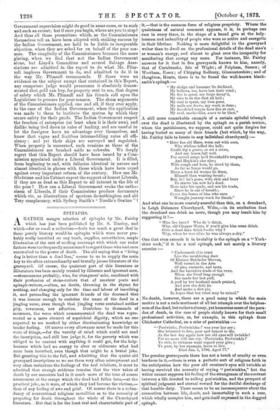THE UNSEAWORTHY SHIPS' COMMISSION.
THERE is only one fact connected with the preliminary Report issued by the Royal Commission appointed to inquire into the alleged unseaworthiness of British registered ships which we can regard with unmingled satisfaction,—that it is preliminary. With all due respect to the Commissioners, we cannot say that they have done their work well. They plead that the number of subjects into which they had to inquire was great, and profess themselves unable in this stage of the business to present a final Report ; but we think that they might have done more than elaborately set forth diffi- culties, and wearisomely enumerate the reasons why they • must confess themselves unable to deal with them. Their report is curiously instructive to the reflective student of history, for it casts a vivid light on what might be a rather puzzling phenomenon,—to wit, the tendency of democracy and despotism to coalesce, the eagerness with which the multitude, whether in arms or not in arms, has wel- comed a Dictator. Given a proved and poignant ill, let the people or the army be perfectly convinced of its existence, or even feel its iron in their own souls ; appoint a Parliament, Board, or Commission to argue over it for months, and to produce nothing but long-winded arguments, like those of this Report, to show that it cannot be grappled with ; and you will!soon find the cry arising for some one strong man to silence the babblement, and do the work. The soldiers of Cromwell, when they heard that the Parliamentary and legal wiseacres who had undertaken the reform of the law had debated for three months on the meaning of the word "in- cumbrance,"—the soldiers of Napoleon, when they muttered that the Little Corporal must go to Paris and break up the Government of talking barristers,—felt very much as we can imagine poor seamen and their friends of the working-class to feel, when they hear that these Dukes, and Admirals, and honourable Members have produced nothing better than this Report. The conditions of the historical parallel which we suggest are fulfilled with singular completeness in the case before us. The masses of fact on which, as on big unhewn stones, the popular mind likes to base its logical structures, are, in this instance, palpable and unquestioned. There is a great loss of life at sea. A large proportion of the loss is preventible. These propositions, which are not disputed, have been made familiar to all men by Mr. Plimsoll's agitation. We cannot find that the Commissioners differ with Mr. Plimsoll on any essential question of fact. They reprimand him indeed, and carefully specify that he accused the Board of Trade of greater negligence than can be brought home to that department ; but they do not controvert any of those statements by which he succeeded in startling the public from the profound indifference to him and his opinions in which they were sunk. We have never scrupled to admit that Mr. Plimsoll has not always tempered his zeal with discretion, but unhappily the zeal that is reduced to a pleasing lukewarmness by discretion is apt to be ineffectual, and it is by no means clear to us that the point or two which the Commissioners make good against Mr. Plimsoll suffice to justify the tone of sharp rebuke, or condescending, semi-insolent approval, which they assume in addressing him. We are very much mistaken if this Report will convince careful and candid observers that Mr. Plimsoll has been much in the wrong, or that he and his supporters are mere unpractical "benevolent men," who know nothing of mercantile affairs, and are "forgetful of the infinite variety of causes which lead to disasters at sea." All the reasons which ever induced us to believe that he was, in the main, right, and that the agita- tion ought to be kept up until some very different result has been obtained than that to which the Commissioners beg us to reconcile ourselves, are to be found within the limits of this Report.
No man with a pretence to intelligence would base an argument for the adoption of measures to prevent loss of life at sea on either of two facts,—first, that loss of life at sea does occur; secondly, that the loss is, as a matter of abstract possi- bility, preventible. It is no attempt to realise, on behalf of seamen, an ideal immunity from risk, that is proposed. The thing asked for has been done, in so far as the question of salvability is concerned ; only it is property that has been saved, and life that has been lost. In his wildest paroxysm of extravagance, Mr. Plimsoll never asked more than that England should do as much to secure the lives of her poor seamen as rich men do to secure their goods. Ships in which rich men send their goods are lost. The people whom the- sagacious Commissioners pat on the head as benevolent fools, are quite sane enough to know that the sea and the tempest contrive now and then to whehu the ingots of the millionaire "fathom-deep in brine." But the extent to which even the furious tempest and the wily sea can be balked in their pursuit of the ingots is considerable. For twenty years, for example, two hundred vessels have been annually taken up and surveyed for the Indian Government, and they have performed the voyage "in almost perfect
safety." The Commissioners honestly include this little fact in their Report, and we really think that the benevolent persons, on whom they smile with a fine blending of sweetness and satire, may retort the charge of simplicity, on the strength of their having stated this fact, and their own general argu- ment, in one and the same Report. For the Commissioners inform us how the Indian Government succeed in all but ex- tinguishing danger to their vessels at sea. Their vessels are surveyed, the amount of free-board is regulated, the amount of dead-weight is fixed, deck cargoes are prohibited. Why, these are exactly the things which Mr. Plimsoll and his bene- volent monomaniacs insist upon in behalf of poor seamen These are the things which, with an iteration wonderful in its patient ingenuity, and morally almost beautiful in its re- signed confession of impotence, the Commissioners tell us cannot be done in the case of those ships in which hundreds or thousands of poor seamen are annually lost. The rhetorical method of the Commissioners is first to acknowledge the parti- cular cause of loss of life alleged in specific instances, and then to explain that its prevention or cure is impracticable. Ships are overladen, but you cannot say whether a load-line ought to be appointed, or whether the evil ought to be assailed in some other way. Therefore, leave it alone. Deck-cargoes occasion loss of life,—bat if you prohibit deck-loading, will you not give an advantage to the foreigner ? Universal survey might reach the evil,—but would it not fetter the invention of shipbuilders, injure commerce, interfere with the freedom of shipowners Government supervision might do good in some cases, or to such and such an extent; but if once you begin, where are you to stop? And thus all those precautions which, as the Commissioners themselves tell us, have been adopted with striking success by the Indian Government, are held to be liable to insuperable objection, when they are asked for on behalf of the poor sea- man. The simplicity of the Commissioners becomes the more glaring, when we find that not the Indian Government alone, but Lloyd's Committee and several Salvage Asso- ciations are admitted in the report to do what Mr. Plim- soll implores Government to do, and admitted to do it in the way Mr. Plimsoll recommends. If there were no evidence on the subject except that contained in this Report, any competent judge would pronounce it absolutely demon- strated that gold can buy, for property sent to sea, that degree of safety which Mr. Plimsoll and his friends call upon the Legislature to procure for poor seamen. The sham arguments of the Commissioners applied, one and all, if they ever apply, to the case of the Indian Government, when the application was made to them to institute the system by which they secure safety for their goods. The Indian Government respect -the freedom of enterprise (at least when it is their own), and dislike being tied down to rules of loading, and are careful to let the foreigner have no advantage over themselves, and know that vague and limitless intermeddling ruins all effi- ciency; and yet their ships are surveyed and regulated. When property is concerned, such evasions as those of the Commissioners are brushed aside as cobwebs. We deeply regret that this Report should have been issued by a Com- mission appointed under a Liberal Government. It is filled, from beginning to end, with fallacies identical in nature and almost identical in phrase with those which have been urged against every important reform of the century. How can Mr. Gladstone and his Cabinet expect the support of honest Liberals, if they are as dead as this Report to all interest in the life of the poor ? How can a Liberal Government evoke the enthu- siasm of Liberals, if their Commissions produce documents which vie, as illustrations of specious do-nothingism and old 'Tory complacency, with Sydney Smith's "Noodle's Oration " ?



































 Previous page
Previous page